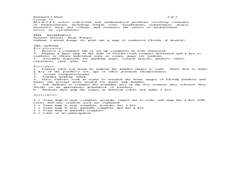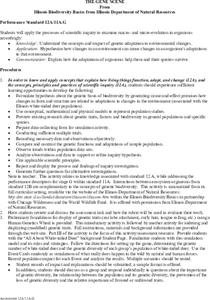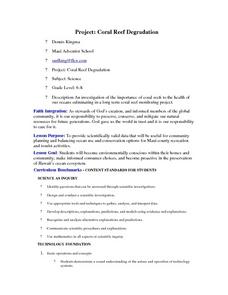Curated OER
Avalanche
Students investigate the concept of avalanches and how they effect people who use the slopes. They conduct research using multiple resources that includes the internet in order to create a final oral presentation.
Curated OER
Groundwater: Cleaning Up
Students research the various aspects of groundwater contamination that threaten health and human safety. They create a model and display that informs other about the health and safety risks. Students illustrate ways in which these...
Curated OER
Trappers Then and Now
Students study how trapping in the Illinois Territory in the 1800's effected the beaver population in the state. They compare methods, rules and regulations of the 1800s to those of today. In groups, they research a variety of...
Curated OER
Investigating Addresses on the Net
Students research selected web sites to gather information on the Lower Republican-Kansas River Basin.
Curated OER
Let's Put a Spin on Things: Graffiti Role Play
Fourth graders examine what is and what isn't graffiti. They role-play various scenarios, research the Graffiti Hurts website, and discuss when graffiti should be reported to local law enforcement.
Curated OER
Is Cancer on the Rise or Decline in America Today?
Students read an article about cancer in the United States. They research a cancer of their choice along with possible treatments. They identify types of cancer that are on the rise and decline for both men and women. They examine the...
Curated OER
Home on the Range
Students use maps and mathematics to determine the appropriate panther population in a given area. In this Florida ecology lesson, students research the area requirements of male and female panther and use a map to help calculate how...
Curated OER
Who's for Dinner?
Fifth graders examine life systems within different biomes. They choose paper plates with the names of animals on them. They research the animals, write reports and draw pictures of them. They create a food chain model by arranging the...
Curated OER
Lesson: Journey of a Tree
Third graders explore the operation of a Christmas farm and how trees are shipped. After taking a tour of a Christmas tree farm and researching transportation, location and cost issues, 3rd graders create a map to show the distribution...
Curated OER
The Aral Sea: A Time for Change
Ninth graders investigate the physical changes in the Aral Sea from the year of 1960. They conduct research to find information. Students compare and contrast the changes caused by human activity over the years. They create their own...
Curated OER
The Gene Scene
Students investigate the concepts of micro and macro evolution. They also research the effects of mutations in the process of genetic adaptation to different environments. They develop a hypothesis of how the environment can influence...
Curated OER
Presenting Ecology through Rodent Control
Students role play the member of a health department task force. In groups, they develop their own recommendations to control the rodent problem in the area. They email their local government official and research information about the...
Curated OER
Coastal Biodiversity of South Africa
Students investigate the biodiversity found along the coast of South Africa. They conduct research using a variety of resources. They use the information in order to write lab reports with the data. The lesson can be adapted to other...
Curated OER
Coarl Reef Degradation
Middle schoolers explore methods of preserving Hawaii's ocean ecosystem. Using underwater cameras, students take pictures of the underwater reef. They perform activities to determine the history and degradation of the coal reef. While...
Curated OER
Trekking to Timbuktu
Middle schoolers view a television show to provide a context for conducting research into the location and culture of Timbuktu. The students complete a report on the subject in the form of a research paper.
Curated OER
Electroplating for Corrosion Protection: Redox in Action
Students define what a redox reaction is. In this chemistry lesson, students electroplate some wires in the lab. They research the application of electroplating in the real world.
Curated OER
Ecology - Ecosystem
Third graders research ecosystems, the work of ecologists, John Muir's contribution to the environment and an endangered species of their choice. They read books, participate in discussions, and write reports.
Curated OER
Watershed Management
Learners investigate the concept of a watershed. They conduct research into the concept using a variety of resources. Students take a field trip to a local watershed to make observations. The outcome is a report concerning the outside...
Curated OER
When Electronics Are No Longer Useful to Us: Disposing Responsibly
Students discover ways to recycle electronics. Through discussion and research, they identify ways in which electronics that are improperly disposed can be harmful to the environment. Students explore how to responsibly dispose of...
Curated OER
State Of The Bay
Young scholars investigate the environmental problems that surround the Chesapeake Bay area. They use an environmental handout as a resource that should be supplemented with research. Also students ask specific questions to report...
Curated OER
Ecological Footprint
Eighth graders discover their own ecological footprint and create a plan for reducing this figure. They extend this to the school and community to see how they are doing on this scale. They discuss the concept of the ecological...
Curated OER
What Makes a Cat a Cat?
Students investigate the lives of pets by videotaping them. In this animal life lesson plan, students videotape a cat and other pets using school cameras in a computer lab. Students review the footage from the cat and other...
Curated OER
Fossil Fuels (Part II), The Geology of Oil
More of a mini-unit than a lesson, these activities lead inquisitors through a survey of oil deposits. In the first part, they read about and view diagrams of sedimentary rock layers that trap oil. Next, they test porosity and...
Cornell University
Field Day: Be an IPM Detective
Become a pest detective! Individually or in small groups, scholars scout the land to discover which pests—plant and animal—inhabit it, determine whether the pests are endangering the environment, and summarize their findings.

























